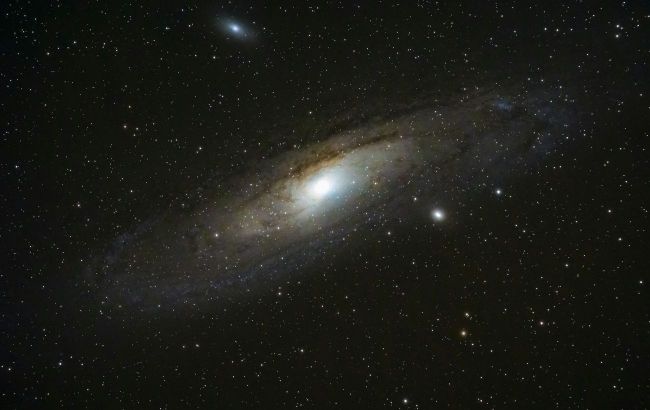10 mysteries of Universe that scientists still puzzling over
 Unsolved mysteries of the universe that science has yet to answer (photo: Unsplash)
Unsolved mysteries of the universe that science has yet to answer (photo: Unsplash)
Humanity has made significant strides in understanding the universe in the vast expanses of space. Despite these achievements, the universe remains full of mysteries that continue to baffle scientists.
RBC-Ukraine discusses the mysteries of the universe that remain unsolved.
What is dark matter
Dark matter is one of the most elusive substances in the universe. It is called "dark" because it does not emit, absorb, or reflect light, making it invisible and detectable only through its gravitational effects.
Despite its mysterious nature, dark matter is believed to make up about 27 percent of the universe. Scientists have proposed various candidates for dark matter, including Weakly Interacting Massive Particles (WIMPs) and axions, but none have been confirmed so far.
What is dark energy
Dark energy is even more mysterious than dark matter. It is a force that accelerates the universe's expansion and is thought to make up about 68 percent of it. The nature of dark energy remains unknown, and understanding it is one of the most significant challenges in cosmology.
Some theories suggest it may be a property of space, while others propose it could be related to a new field or particle.
What happened before the Big Bang
The Big Bang theory describes the origin of the universe as an explosion from an infinitely dense point but does not explain what, if anything, preceded this event. The concept of "before" the Big Bang may not apply if time itself began with this event.
Various theories have been proposed, including multiverse and cyclical models, but there is no definitive answer yet.

An artistic interpretation of the Big Bang with images of the early universe and its expansion (gif: NASA)
Are we alone in the universe
The question of extraterrestrial life is one of the most intriguing.
Despite extensive searches, including missions to Mars, studying extremophiles on Earth, and detecting exoplanets in the habitable zone, no compelling evidence of life beyond Earth has been found.
The discovery of microbial life on another planet or moon would have profound implications for our understanding of life in the universe.
What is the fate of the universe
The ultimate fate of the universe remains a topic of debate. Will the universe continue expanding forever, eventually leading to "heat death," where all stars burn out, and galaxies drift apart? Or will it experience a "Big Crunch," where expansion reverses, and everything collapses into a singularity again?
Another possibility is the "Big Rip," where dark energy eventually tears apart galaxies, stars, and even atoms. Observations of the universe's expansion and the properties of dark energy will help determine its ultimate fate.
What is the nature of black holes
Black holes are regions of space where gravity is so strong that not even light can escape. The event horizon, the boundary beyond which nothing can return, is mysterious.
The exact nature of what happens inside a black hole and how information is preserved remains one of the biggest enigmas in theoretical physics.
Recent observations of gravitational waves from black hole mergers have provided new insights and raised new questions.

Direct radio image of a supermassive black hole (photo: Wikimed
Why is there more matter than antimatter in the universe
The universe appears to consist predominantly of matter, while antimatter is rare. According to the Big Bang theory, matter and antimatter should have formed in equal amounts. However, the observable universe shows a clear predominance of matter.
This asymmetry, known as baryon asymmetry, remains unexplained. Various theories have been proposed, including CP violation in particle interactions, but none have provided a complete answer.
What are the fundamental forces of mature
The universe is governed by four fundamental forces: gravity, electromagnetism, the strong nuclear force, and the weak nuclear force. Efforts to unify these forces into a single framework, known as the Theory of Everything, have been ongoing for decades.
Leading candidates include string theory and loop quantum gravity, but experimental evidence is still lacking. Understanding how these forces interact at a fundamental level is a key goal of theoretical physics.
What is the true nature of time
Time is fundamental to our experience, but its true nature remains unclear. Is time continuous or discrete? Does it flow in one direction, or can it behave differently at the quantum level?
The theory of relativity shows that time is relative and can be altered by speed and gravity. Still, a complete understanding of time remains elusive, especially in the context of quantum mechanics.
How did life originate
The origin of life on Earth is another profound mystery. Various hypotheses exist, including the primordial soup theory and the hydrothermal vent hypothesis, but none have been definitively proven.
Understanding how non-living chemical compounds transitioned into living organisms is crucial for comprehending the origin of life and its possible existence elsewhere in the universe.

Some researchers believe that life may have originated in deep-sea hydrothermal vents (photo: University of Chicago News)

